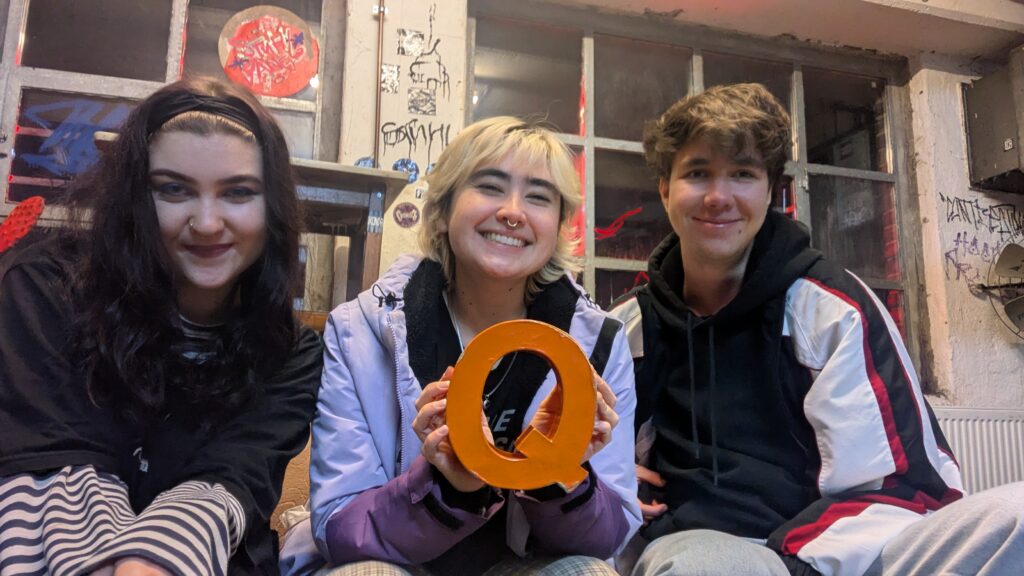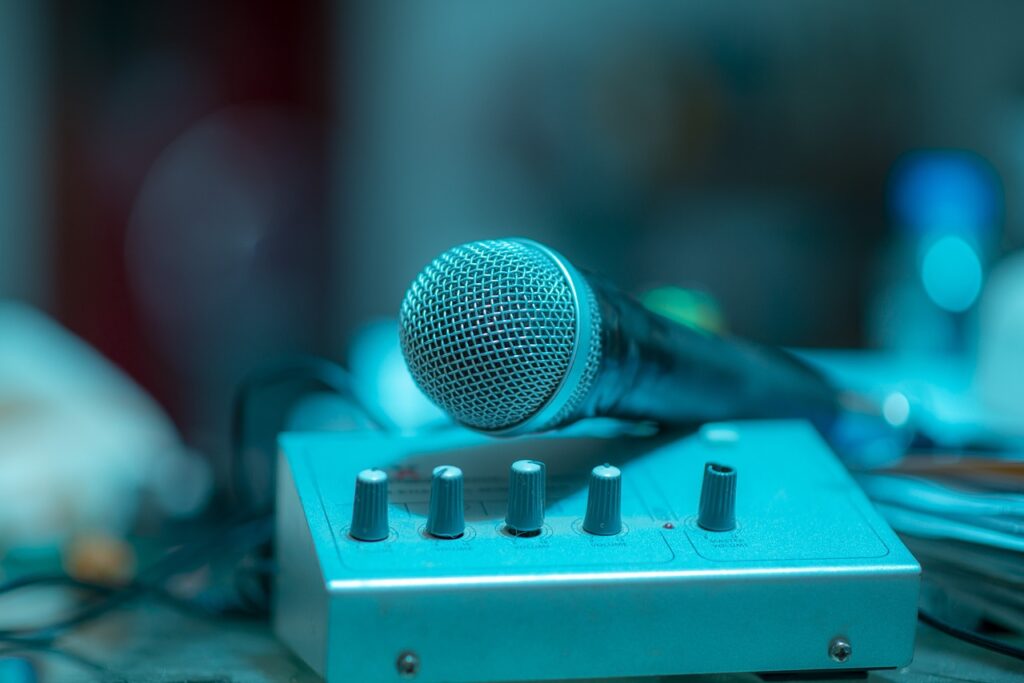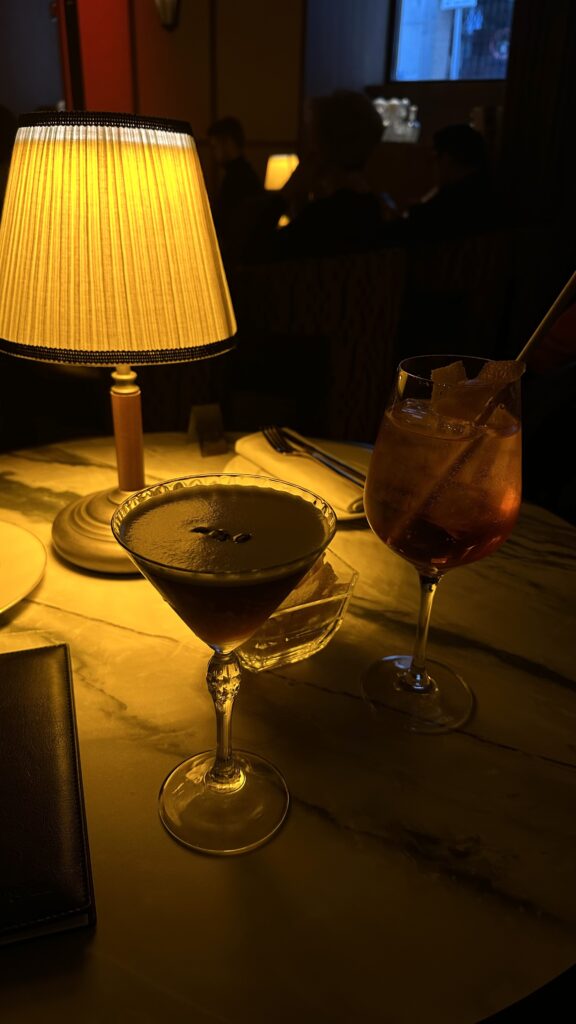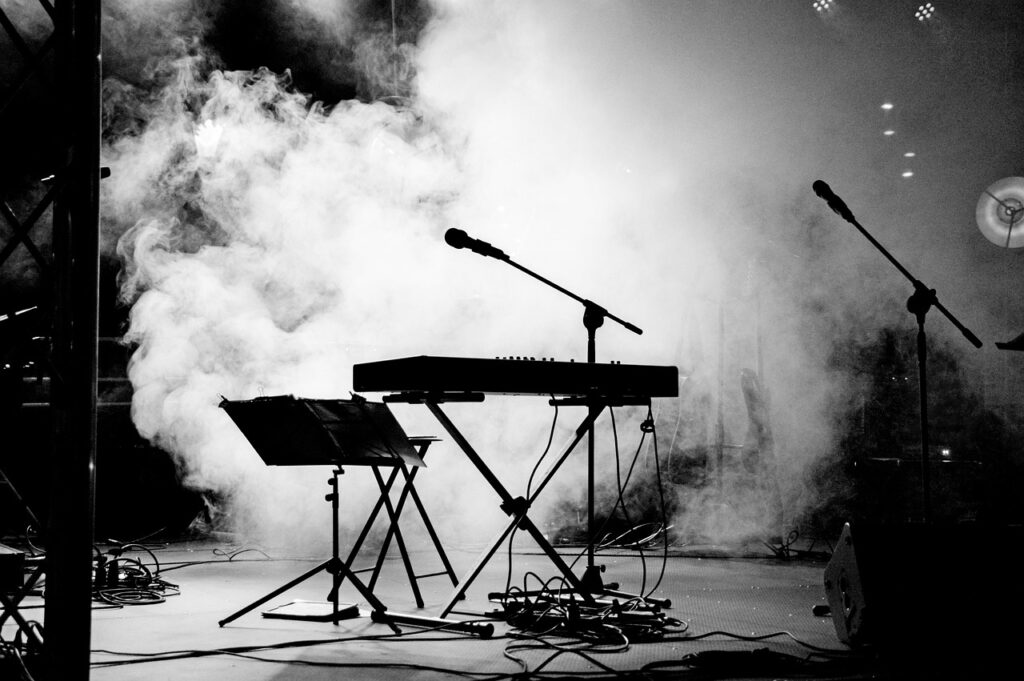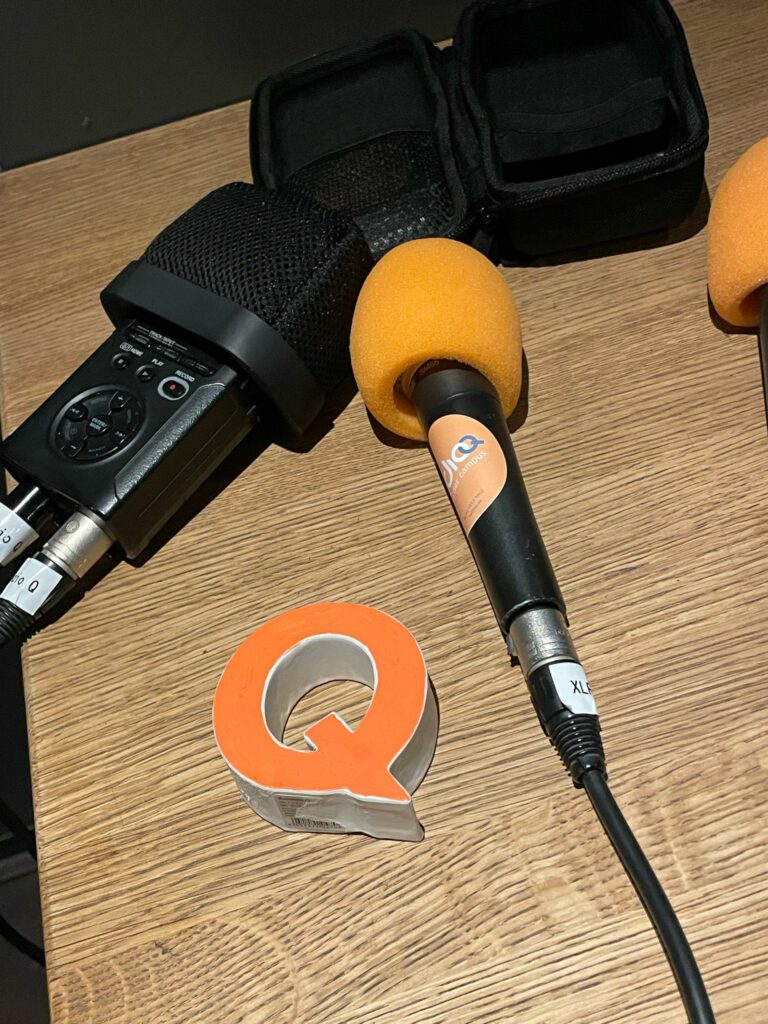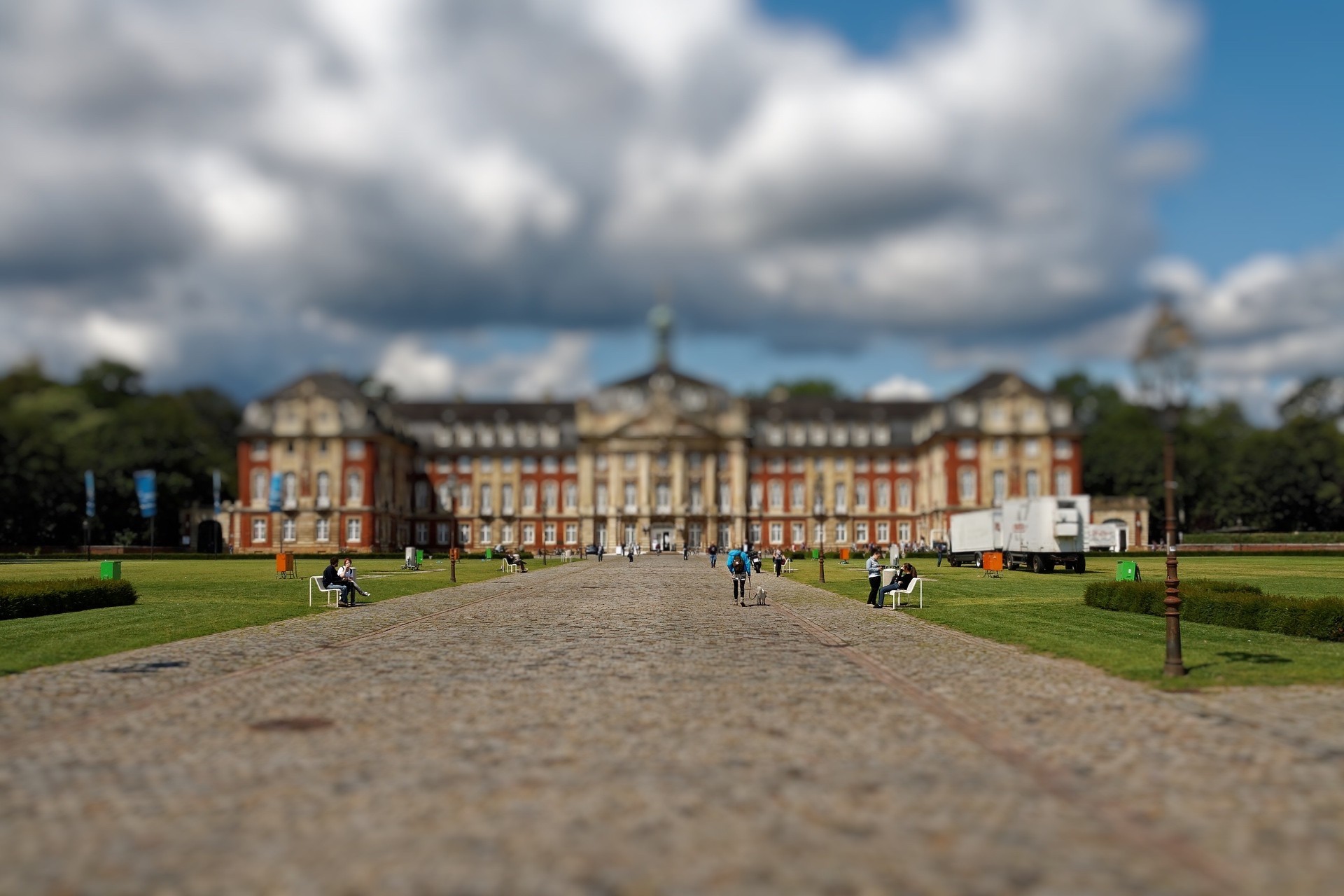Alexia Roditis von Destroy Boys im Interview
Written by Sam Höfers on 12. März 2025
Schon seit 2015 Jahren macht die Band Destroy Boys Musik – voll mit Energie, Wut und Emotionen. 2024 veröffentlichten sie ihr viertes Album Funeral Soundtrack #4. Vor ihrem Konzert im Gleis 22 in Münster traf sich Frontperson Alexia Roditis mit den Radio Q Redakteur*innen Ruby Rübsamen und Sam Höfers, um über die Tour und die fast 10 Jahre Band Erfahrung zu sprechen.
Q: You’ve come here from the other side of the globe to our little student town. There might be some of our listeners who don’t know who you are quite yet. Can you introduce yourself?
Alexia: Hello, my name is Alexia Roditis, and I am the singer, front person of the alternative rock band, Destroy Boys. We’re from the United States, California. I currently live in Los Angeles. We’re here on tour. Münster is our second to last stop on this European run.
Q: We’re meeting you here, two weeks after you first started your tour through Europe. Are there differences you’ve experienced playing in Europe versus in the US?
Alexia: Oh, absolutely. So Germany, specifically, actually, the fans tend to be very polite, from what I’ve seen. A lot more polite than they are in the States and in the UK, and even Paris, Barcelona, Spain, different parts of Europe. In Germany, people tend to not scream in between songs, Berlin was a little more rowdy, I suppose. In between the songs, it’s very quiet. If we don’t have music playing on stage, it’s silent. So this It’s a little more polite than other audiences.
Q: That’s so interesting to hear because that’s all we’re used to, you know? We never experience something else.
Alexia: No, yeah. It’s very quiet. Usually, I feel like people are like, “Play this song”, or like, “I love you”, or like, “You’re so hot”, or whatever.
Q: “I want to have your baby!”
Alexia: “Spit on me” I’m like, “Nooo!”
Q: Let’s talk about your newest album. It’s called Funeral Soundtrack #4. What exactly is it that you’re burying?
Alexia: I suppose we’re burying our younger selves. I’m 25 now, and I was 23 when we started recording the album. So burying, I don’t know, the old ways of doing things, like self-doubt and getting taken advantage of, like trying to bury that, trying to grow confidence, I suppose.
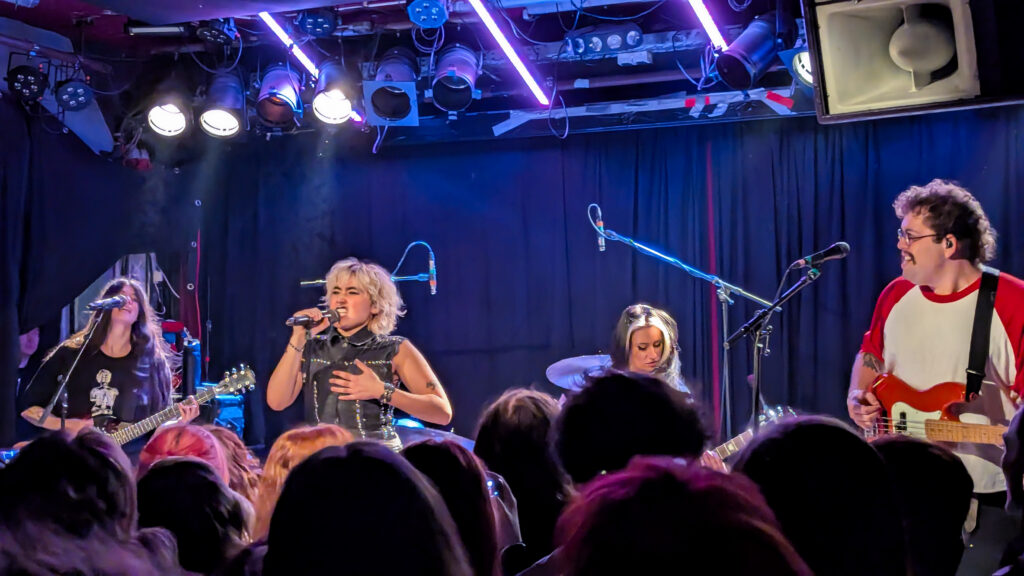
Q: Destroy Boys has existed for quite a while now already. We were wondering, how has your understanding of each other in the band evolved over time?
Alexia: Wow, what a great question. It has evolved so much. I haven’t really been asked about that. So many bands break up, and it’s usually because of the band dynamic, because the band starts to hate each other or something. I mean, you spend so much time with people. You get to learn every single thing that you love about them and every single thing that you don’t like about them. I would say that over the years we’ve learned, and me and Vi specifically, because we’ve been in this for the longest time, I’d say that we’ve learned how to communicate with each other, how each other responds to communication, like be able to approach certain things in the right way. In the band, we’ve all just learned what we find funny, what we really don’t like hearing about, all the different laughs, all the different bits that we can do. Favorite movies, favorite music. You learn so much about a band, about each other when you’re on tour, especially us. We’re very close. We like to spend a lot of time with each other. But I’d say that the main thing that’s kept us around for a long time is being able to care for each other’s emotions and communicate with each other effectively and quickly. I think that we’ve just learned how to efficiently interact with each other.
Q: That’s really important, I bet, to survive on tour and as a band. I was also wondering if you noticed, that the way people talk and write about your band has changed over the years?
Alexia: Definitely. I think that when we first started, we definitely just weren’t taken as seriously. It was more like a cute high school band that was like, riot girl, and like, oh, they’re so punk, and blah, blah, blah. We would be like, can you please not say this in your article, and they would make that the headline. I remember, I’m pretty sure the journalist who wrote this is actually a good friend of mine now. But we were like, please don’t call us a feminist punk band. We don’t really write punk music, and what we write about isn’t feminist stuff. We as people, we are feminists, but that’s not really the topic of the band. So that feels like an important distinction to me, where it’s like, I feel like a feminist punk band, you’re going to have songs that are about feminism. Our songs are more about relationships and other stuff in high school. And then literally, the headline was Feminist Punk Band from Sacramento, blah, blah, blah. And I was like, oh my fucking God, dude. I think the people ask us more in-depth questions now. They focus a bit more on the music and certain aspects of my identity, specifically, which I appreciate. I think the questions have gotten better, but it’s not always the case. Actually, what I’ve noticed is that the journalists have become younger, which I really appreciate. I feel like the people who interview us were the same age. And I really like that because we can relate to each other on a different level. And I really feel like younger people just ask way more interesting questions. It’s less basic questions. It’s like, y’all do your research.
Q: Yeah we try to, at least. You’ve talked about how you include topics about gender and identity in your songs. What was important to you while writing those songs on the newest album?
Alexia: It’s funny because Boyfeel is the most gendered song. That’s not true. You Hear Yes, which is about patriarchy and women and just everybody who’s affected by patriarchy, being afraid of walking around and the gender pay gap and all that stuff. And then Boyfeel is about my experience as a non-binary person. I really wanted to have songs about both of these things because I realized that we haven’t had a very feminist song, very upfront in your face, feminist song in a couple of years. It just felt like that was needed. And I chose to have, Missy from Mannequin Pussy and Kat from Scowl on You Hear Yes because I feel like there’s a lot of competition between “girl bands” in the music industry. It really has felt like there can only be one, or that people just want to pit the girl bands against each other all the time in a way they wouldn’t do with boy bands. Boy bands, meaning Blink 182 and shit. Love them, by the way. Man band, I suppose. Even though, a band of women would get called a girl band, too. And even I have those feelings of competition and jealousy sometimes, and I really wanted to show people that we are friends and that there’s camaraderie, and please don’t pit us against each other. I love these people. They’re making incredible art. You can like more than one band at the same time. And it also just felt important to me because patriarchy affects me every single day of my life. I hate being cat-called. I hate being concerned about what I have to wear outside, even that I have to even think about that. I really don’t like being on edge when I’m walking around, just out and about or at a bar, I have to be worried about someone touching me or someone following me home or someone spiking my drink or someone talking to me for way too long, even though I’m clearly not interested. So I wanted to write about that. That’s a gender issue. And then as far as Boyfeel, I actually wrote that song maybe seven years ago, in 2017. Seven or eight years ago, when I was 17. So I’ve been nonbinary a long time. I just didn’t know that that’s what it was. That song is very personal to me in my experience. When I write music, I really like to fill the gaps of music that I haven’t heard yet. So Boy Feel, and You Hear Yes, are songs that I needed.
Q: Thank you for sharing that.
Alexia: Yeah, thank you for listening.
Q: Let’s talk about the people that come to your shows. What feelings do you want people to walk away with from your shows?
Alexia: I want them to walk away feeling like they got to have fun and mosh and get to escape the political climate a little bit. I want them to feel like they entered into the church of rock and that they had a really good time. First and foremost is just enjoying the music, enjoying community with other people. I also want them to walk away with a sense of empowerment, that they can make the world a better place if they want to, that they should.
Q: You also invite local political groups or activist groups to your shows to speak. Why do you think a concert should be a place for activism and politics?
Alexia: So I grew up in the punk scene, and a lot of punks were very political, especially at the beginning. I feel like it’s been slightly lost. So Dead Kennedy and the Clash are two of my biggest inspirations as far as rock music goes. They just had a way of incorporating the political into their music and into their scenes. So I think it’s important to involve politics in music because music is a uniting force. It’s such a special art form because you could be anybody and you could all like the same music. There’s something about sound that’s very spiritual to me. We also don’t have that many gathering spaces and third spaces, so I feel like it’s a really potent space for change and transformation. Even music, Especially singing, you literally make something out of nothing or out of air, so I feel like there’s something very spiritual there. That’s just part of what punk is for me. Not every musician needs to make their entire show political, but I feel a responsibility as somebody with the platform to give that platform to other people. And honestly, I’m affected by the political climate. My fans are, everybody is. And especially with authoritarianism and fascism on the rise in various places. I just don’t know why you wouldn’t. And it’s also literally not even that hard. And it’s very fun, too. I have a lot of fun connecting with different groups. And I want people to feel like they can change something, so I think it’s important for that reason, too.
Q: And do you maybe have a piece of advice for people who feel overwhelmed with politics around right now?
Alexia: Yeah, I just had therapy, and my therapist and I were talking about this. I actually have some excellent advice. I have a problem where I go on TikTok, and I am overwhelmed with news and information, and it’s doom and gloom, a lot of it. I feel like, oh, I have to know this. Even though the vast majority… I’d say 95% of the information I will forget or I can’t do anything with it. She recommended, be intentional about when you’re consuming the news. Do it a couple of times a week. You don’t necessarily have to do it every day, and you could still be very well-informed. She was like, find a podcast or a medium that will do a weekly recap so that you can learn things. So that’s tip number one, is not feeling like you have to overwhelm yourself constantly in order to be a good person. I don’t need to know everything about everything that’s going on in order to take action in the world. I don’t read a lot of political philosophy or any of this shit because I care more about what I can actually do, which is why I started bringing these activist groups because I was like, Okay, well, I’m not a student anymore, I can’t research. I’m not great at disseminating political information, but I am good at getting those people in front of other people. So I’m going to do that. I’d say also focusing on what you can do is really helpful. It’s been helpful for me to not focus as much on the outside and every single problem, but more so, hey, what can I actually do near me. So that includes things like writing music about it, writing poetry, writing essays. It could also be making drawing or painting. It could be dancing, making art about whatever you’re feeling is a great constructive way to process your feelings. And also looking into local organizations that are doing the work that you want to support, because there are a lot of groups that are doing important shit. The news also doesn’t tend to show you the good things or the work that people are doing on the ground right now. But you will find that if you look up Food Not Bombs, or a feminist group, an antifascist group, Die Linke, all these sorts of things you can look into. And going to these places because they need people. These groups exist already, and they just need people who can volunteer their time, really.
Alexia: I think that sometimes we get caught up with, I want to make the biggest impact ever. But it’s like, no, dude, we all got to think we’re little ants, and we’re all working towards the same place, but every single ant is important to the colony. Every bee is going to make the hive full of honey. It’s not just one big bee that’s going to fix everything. It’s like everybody working in tandem. So focus on what you can do. I’m not even a big proponent of celebrity or making people, especially activists, super famous, because then once we put them on the pedestal, they’re easier to take down. We need leaders, not celebrities. The Democratic Party in the States is not just Kamala Harris or Bernie Sanders. It’s all the other representatives. I’m not a huge fan of the Democratic Party, but it’s an example. Even Destroy Boys as a band, it’s not just me. It’s the rest of the band, there’s four more people. It’s also our sound tech. It’s our guitar tech. It’s our bus driver. It’s our tour manager. It’s our manager. It’s our booking agent. There’s all these other people that are working. So focusing on what you can do locally is extremely important, and we can all just be the bees. Let’s go be the bees.
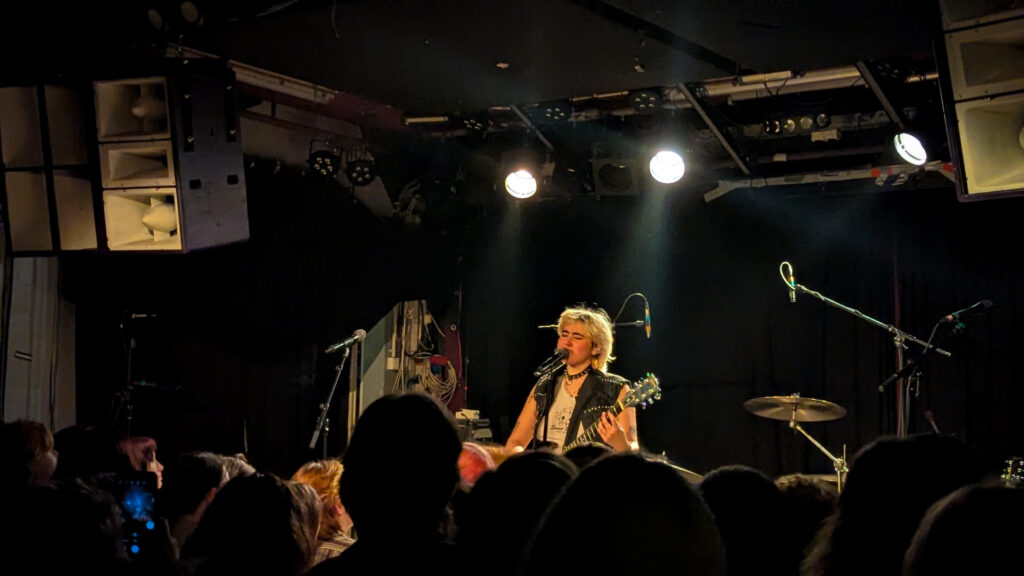
Alexia: I just want to share my perspective. Feel free to disagree, you are absolutely more than welcome to do that. If you do, please don’t be super fucking rude to me about it. That’s all I ask. Just don’t be really mean to me about it because I’m really not trying to step on anybody’s toes, but I am trying to offer my perspective.
Q: One last question. Is there anything on your mind you want your German fans or new listeners to know? Something that bothers you, something that’s just simply on your mind, you don’t know why, can be as big or as small as you want it to be.
Alexia: I do have a thought. This is actually… This is a big one, though. I’m getting really nervous as I’m thinking about this. But it has to do with Palestine and Israel. I want I would say that I completely understand why Germans want to protect the state of Israel, given your cultural history, which is why I wasn’t even sure if I was going to broach this topic in Germany, because I understand the responsibility that you all must feel to Jewish people. And I don’t mean to discount that at all, and that is absolutely not my intention with what I’m saying. I just simply want to bring attention to other perspectives, because if we are going to listen to Jewish people, we must also listen to the ones who are telling us that Palestine must be free. It is not really fair to only listen to Jewish people who, or who believe in Zionism, because there are many, many, many Jewish people who do not support the state of Israel because it is a colonial state, much like the United States is. The United States, for example, is built on the genocide of Indigenous people. That is a fact. A fact that my country has not reckoned with. I’m at least glad that Germany has reckoned with their cultural history a bit. It is just really tragic what’s happening in Gaza and in Palestine right now. It really breaks my heart that my tax money is funding this and that people are being convinced that mass murder of any group of people is okay because it’s not. Period. I simply implore you to look into perspectives that may not mirror your own because you might learn something new. Do some research. Make sure you’re listening to Palestinian voices and anti-Zionist Jewish perspectives as well, because there is a lot of propaganda that has to do with Israel and Palestine. But I would just look into it. Israel has been committing colonial settler violence against Palestinians since its conception. And I think that what most people at the end of the day want is for Palestinians and Jewish people, Israelis, to live in the same land together, peacefully. Zionism and Judaism are not the same thing. And look into organizations like Jewish Voices for Peace, if you don’t believe me. Because I see the German opinions being more aligned with the American opinions on that, and that is not a good sign. As an American, that’s not a good sign. The United States is funding an ethnic cleansing currently. I guess what I would want to say is it is not inherently anti-Semitic to be anti-Zionist. That’s, I think, what I would like to say. And also, any lingering thoughts for the German audience? I don’t know. I fuck with you all. I like you. They’re funny. I really like Germany a lot. I love the graffiti. I love the techno. I like your German compliments. Do you all know that we say that Germans give German compliments?
Q: Okay wait what’s that?
Alexia: A German compliment?
Q: Can I guess? Can I guess?
Alexia: Yeah, please.
Q: I suppose it’s something that seems like a compliment, but when you think about it a bit, it’s also criticizing you.
Alexia: Yeah, pretty much. Or it’s almost the reverse, where it’s like I’m trying to think of an example. (With a german accent) “The last time you all were here, it was not very good, but this time it was pretty good. So good job.”
Q: Was that your German impression?
Alexia: It’s not very good.
Q: Okay, maybe before we lose ourselves in this, let’s bring this to an end. Thank you so much for your time.
Alexia: Thank you so much. Thank you, Sam. Thank you, Ruby, for having me. I really appreciate it.
Q: Thank you, Alexia.
Alexia: Thank you, Radio Q.
